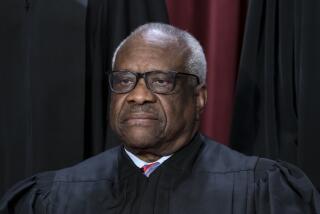Texas Bar Seeks Kinder, Gentler Lawyers
- Share via
DALLAS — Lawyers and judges concede that their profession probably will not set any standards for social graces, but they are giving good manners a shot nevertheless.
A new Lawyer’s Creed--the first such statewide code in the nation--was recently approved by the Texas Supreme Court and the Texas Court of Criminal Appeals.
It asks the state’s 52,000 lawyers for kinder litigation.
No more obnoxiousness. No more tit-for-tat unprofessional behavior. No more stalling tactics. And no “allusions to personal peculiarities or idiosyncrasies of opposing counsel” will be allowed, according to the creed. Lawyers and judges say the let’s-be-civil creed is overdue.
“It’s kind of like dieting,” Texas Supreme Court Justice Eugene Cook said. “It’s a battle that we can win, but it’s not going to be done overnight.”
Cook said the creed was initiated by Dallas and Houston legal associations to fight bad behavior and needlessly aggressive courtroom tactics.
The offending behavior--including rudeness, engaging in lengthy procedural delays, even resorting to fistfights--has been clogging court schedules and hampering disposition of cases.
Cook said some lawyers try to reschedule proceedings on dates most likely to bother an opponent.
“If they know of a time that will be inconvenient--say the day your wife is having a baby or the week you’ve been planning all year for a vacation--that’s when they’ll schedule it,” he said.
“Some people think that it’s the way to practice law, to be rude and abusive and try to intimidate the other side.”
He said the problems have become increasingly common in the last five years.
U.S. District Judge A. Joe Fish said that part of the problem may be the increase in lawyers in the state’s largest cities.
“I think the Rambo tactics arise out of the feeling that ‘I’m never going to see the other lawyer again,’ ” he said.
Dallas Bar Assn. President Al Ellis said financial woes also have increased courtroom problems.
“As the law firms have gotten bigger and the economy has gone down, there’s been a lot of pressure on younger and middle-management lawyers to produce, and some have responded with this kind of behavior,” he said.
The 34-part Lawyer’s Creed, developed by a committee with representatives from 18 legal associations, relies on voluntary compliance and includes no specific penalties.
The creed includes requirements of civility toward peers and judges and a ban on “antagonistic or obnoxious behavior.”
“Some judges have copies of the creed pasted to their courthouse doors,” Cook said. “They tell the lawyers (to) go outside and read it and don’t come back in until they learn how to act accordingly.”
More to Read
Sign up for Essential California
The most important California stories and recommendations in your inbox every morning.
You may occasionally receive promotional content from the Los Angeles Times.













